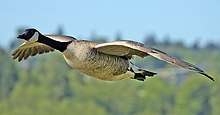goose
English
Etymology
From Middle English goos, gos, from Old English gōs, from Proto-Germanic *gans, from Proto-Indo-European *ǵʰh₂éns (compare West Frisian goes, North Frisian göis (also Fering-Öömrang dialect North Frisian gus; Sölring dialect North Frisian Guus; Heligoland dialect North Frisian gus), Low German Goos, Low German Gans, Dutch gans, German Gans, Danish, Swedish and Norwegian gås, Icelandic gæs, Irish gé, Latin ānser, Latvian zùoss, Russian гусь (gusʹ), Albanian gatë, Ancient Greek χήν (khḗn), Avestan 𐬰𐬁 (zā), Sanskrit हंस (haṃsá)).
The tailor's iron is so called from the likeness of the handle to the neck of a goose.
Pronunciation
- enPR: gōōs, IPA(key): /ˈɡuːs/
Audio (UK) (file) Audio (US) (file) - Rhymes: -uːs
Noun

goose (countable and uncountable, plural geese)
- Any of various grazing waterfowl of the family Anatidae, which have feathers and webbed feet and are capable of flying, swimming, and walking on land, and which are bigger than ducks.
- There is a flock of geese on the pond.
- The flesh of the goose used as food.
- 1843, Charles Dickens, “Stave 3: The Second of the Three Spirits”, in A Christmas Carol:
- Mrs. Cratchit made the gravy (ready beforehand in a little saucepan) hissing hot; Master Peter mashed the potatoes with incredible vigour; Miss Belinda sweetened up the apple-sauce; Martha dusted the hot plates; Bob took Tiny Tim beside him in a tiny corner at the table; the two young Cratchits set chairs for everybody, not forgetting themselves, and mounting guard upon their posts, crammed spoons into their mouths, lest they should shriek for goose before their turn came to be helped.
-
- (slang) A silly person.
- (archaic) A tailor's iron, heated in live coals or embers, used to press fabrics.
- c. 1606, William Shakespeare, “The Tragedie of Macbeth”, in Mr. William Shakespeares Comedies, Histories, & Tragedies: Published According to the True Originall Copies (First Folio), London: Printed by Isaac Iaggard, and Ed[ward] Blount, published 1623, OCLC 606515358, [Act II, scene iii]:
- Come in, tailor. Here you may roast your goose.
-
- (South Africa, slang, dated) A young woman or girlfriend.
- (uncountable, historical) An old English board game in which players moved counters along a board, earning a double move when they reached the picture of a goose.
Usage notes
Synonyms
- (tailor's iron): goose iron
Derived terms
- Abyssinian blue-winged goose
- Abyssinian goose
- African pygmy goose
- Andean goose
- ashy-headed goose
- Australian pygmy goose
- a wild goose never laid a tame egg
- barnacle goose
- bean goose
- black goose
- blue goose
- blue-winged goose
- brand goose
- brent goose
- cackle like a goose
- cackling goose
- Canada goose
- Canadian goose
- Cape Barren goose
- Chinese goose
- Christmas goose
- colonial goose
- common snow goose
- cook somebody’s goose
- cook someone's goose
- cotton pygmy goose
- deep goose foot
- domestic goose
- duck, duck, goose
- dunter goose
- dwarf goose
- Egyptian goose
- embergoose
- ember-goose
- emmer-goose
- game of the goose
- golden goose
- gooseberry
- gooseberrying
- gooseberryish
- gooseberrylike
- goosebump
- goose bump
- goose-bump
- goosebumped
- goosecap
- goose club
- goosedown
- goose egg
- goosefish
- gooseflesh
- goose flesh
- goosefleshed
- goosefleshy
- goosefoot
- goose foot
- goose game
- goosegob
- goosegog
- goose grass
- goose-grass
- goosegrass
- gooseherd
- goose iron
- goose is cooked
- goose-ish
- gooseish
- gooselike
- goose-like
- gooseling
- gooseneck
- goose-pen
- goosepimple
- goose pimple
- goosepimply
- goosequill
- goose-rumped
- goosery
- gooses
- goose’s foot
- goose skin
- gooseskin
- goosestep
- goose-step
- goosestepper
- goose-stepper
- goosetongue
- goose up
- goose wing
- goose-wing
- goosewing
- goosey
- Goosey Goosey Gander
- Goosey Night
- goosish
- goosy
- gray goose
- greater snow goose
- Greenland snow goose
- green pygmy goose
- grey goose
- greylag goose
- Hawaiian goose
- imber-goose
- kelp goose
- kill the goose that lays the golden eggs
- laughing goose
- lesser snow goose
- like shit through a goose
- loosey-goosey
- loosey goosey
- Magellan goose
- magpie goose
- magpie-goose
- Malagasy sheldgoose
- Mother Carey's goose
- Mother Goose
- New Zealand goose
- one's goose is cooked
- Orinoco goose
- pink-footed bean goose
- pink-footed goose
- poor man's goose
- pygmy goose
- rood goose
- Ross’s goose
- Ross’s snow goose
- ruddy-headed goose
- sauce for the goose
- say boo to a goose
- sea goose
- sheldgoose
- silly goose
- snow goose
- solan goose
- sound on the goose
- spur-winged goose
- superficial goose foot
- swan goose
- the old woman is plucking her goose
- true goose
- upland goose
- ware goose
- what's good for the goose is good for the gander
- what's sauce for the goose is sauce for the gander
- white-fronted goose
- white goose
- wild goose
- wild-goose chase
- wild goose chase
Translations
|
|
Verb
goose (third-person singular simple present gooses, present participle goosing, simple past and past participle goosed)
- (slang) To sharply poke or pinch someone's buttocks. Derived from a goose's inclination to bite at a retreating intruder's hindquarters.
- To stimulate, to spur.
- (slang) To gently accelerate an automobile or machine, or give repeated small taps on the accelerator.
- (British slang) Of private-hire taxi drivers, to pick up a passenger who has not pre-booked a cab. This is unauthorised under UK licensing conditions.
- (transitive, slang) To hiss (a performer) off the stage.